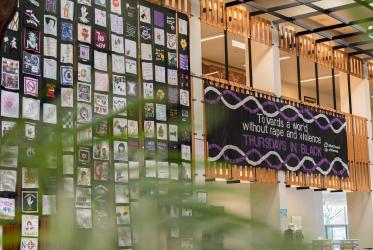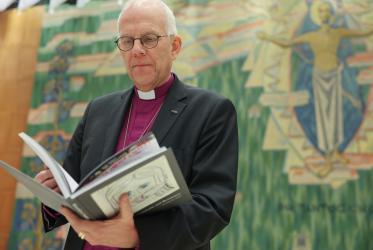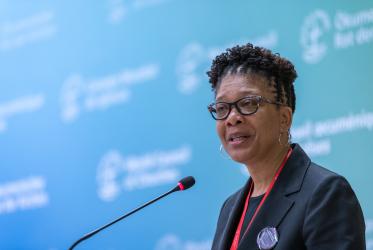The special initiative—and a video inspiring even more young people to get on board—was created at the conclusion of a workshop, organized by World Council of Churches and World Association for Christian Communication, on 11-14 December to address online gender-based violence.
Youth from around the world described what motivated them to take this unprecedented step.
Emma Rahman, from Trinidad and Tobago, was a spokesperson for announcing the Thursdays in Black Youth Edition. “We want to bring the hope and light against the darkness and violence we are facing,” she said.
Mariam Agladze from Georgia, a documentary filmmaker, shared a short video using actual audio from emergency calls to police from women, which inspired national visibility on violence against women. “Some women texted me and said thank you— this gave me the power to step up and speak aloud about my own family issues.”
In their launch video, Ruth Mathen stated, “Intimate partner violence is a social disease” noting that over 55% of women in Asia experienced intimate partner violence at least once.
And Olivia Vakacegu from Fiji shared her pledge to make sure “young people are informed on the topic of gender-based violence.”
Brian Muyunga shared how he has seen the level of gender-based violence between students at his university in Kenya and transactional sex—even within the church. But, Muyunga also shared, there are few opportunities or channels to talk about it.
He heard about Thursdays in Black and thought that was a channel to help the discussion. He began introducing the campaign in classes, and telling his peers how to get involved. “It starts as a way just to show concern and solidarity”: he said. “It grew to official launches in universities and churches in Kenya, and Uganda—and continues to grow.”
Thursdays in Black—particularly the Youth Edition, ”creates spaces for students to share experiences,” Muyunga said.
A youth koinonia
Samuel Munayer, shared how the Thursdays in Black Youth Edition will be relevant in the Middle East, particularly Palestine.
“The Middle East has a high population of young people—and yet youth participation in
government, churches, and organizations is very low,” said Munayer. “So having youth in such an initiative is very important. Gender-based violence is used a lot in the Middle East, especially in crisis and war. “
The colour black is important, added Munayer.
“In my context, black shows your public mourning, your public lament,” he said. “Many times when you grieve, you do it privately. By doing this publicly, we show we want to change. It is one baby step to something more that is needed to tackle gender-based violence. “
Lani Anaya Jiménez shared the reality of violence against women in her native Mexico: “For many years, when we talk about young people facing conflict, we often look at them either as perpetrators or victims. We want young people to be seen as people contributing to peace and leaders today. Young people are not the future—young people are the present,” she said.
Showcasing the creative energies in the movement, Nenase Kavafolau from Tonga shared a dance of solidarity, “to bring light against the darkness and violence”.
And the young people are connected in many ways around the globe. Daniela Zelaya Raudales and Talisa Avanthay shared how World YWCA leaders show their solidarity against gender-based violence through Thursdays in Black.
Emma Rahman, who presented the aims of the Thursdays in Black Youth Edition, said that the sharing aspects of the network will be key.
“Everyone has a story,” she said. “We know someone who has been affected, or we have been affected. Each of our narratives is different. We want to create space, and honor our differences and narratives.”
She concluded: “We aim to be koinonia. Koinonia is a fellowship, not a hierarchy. A community to bring us together.”








